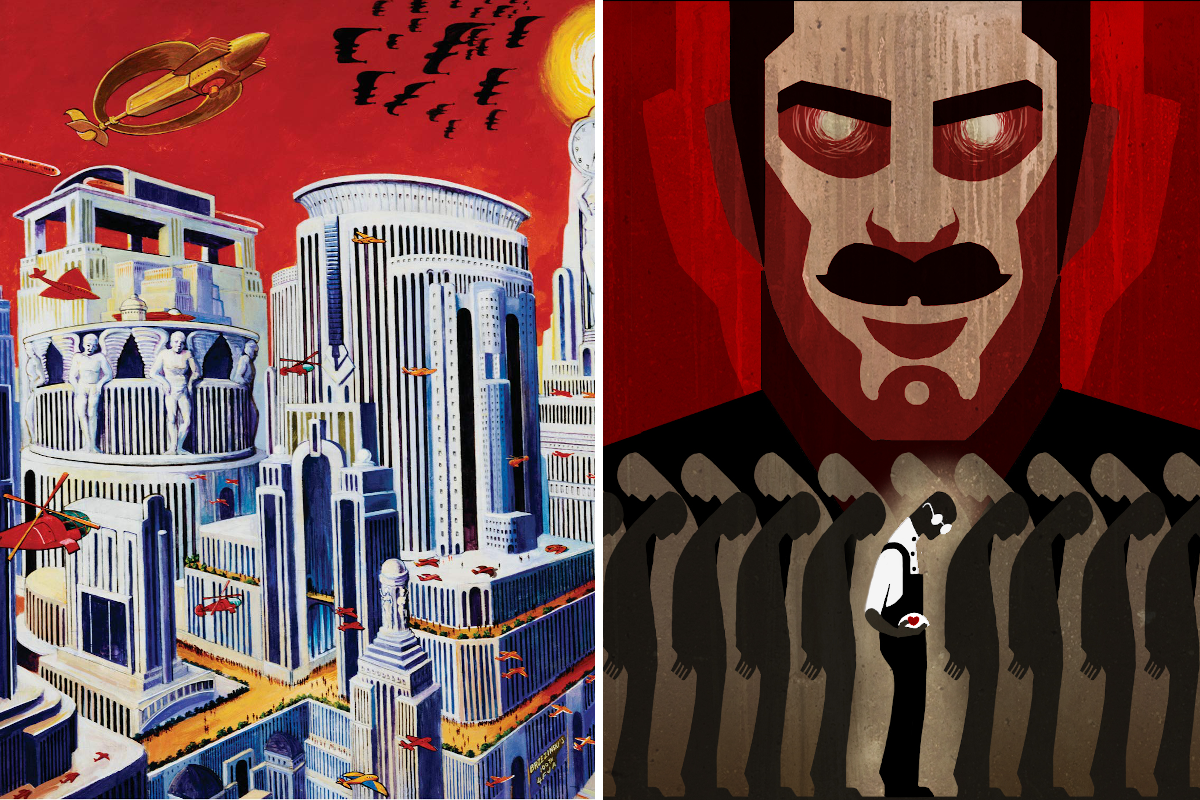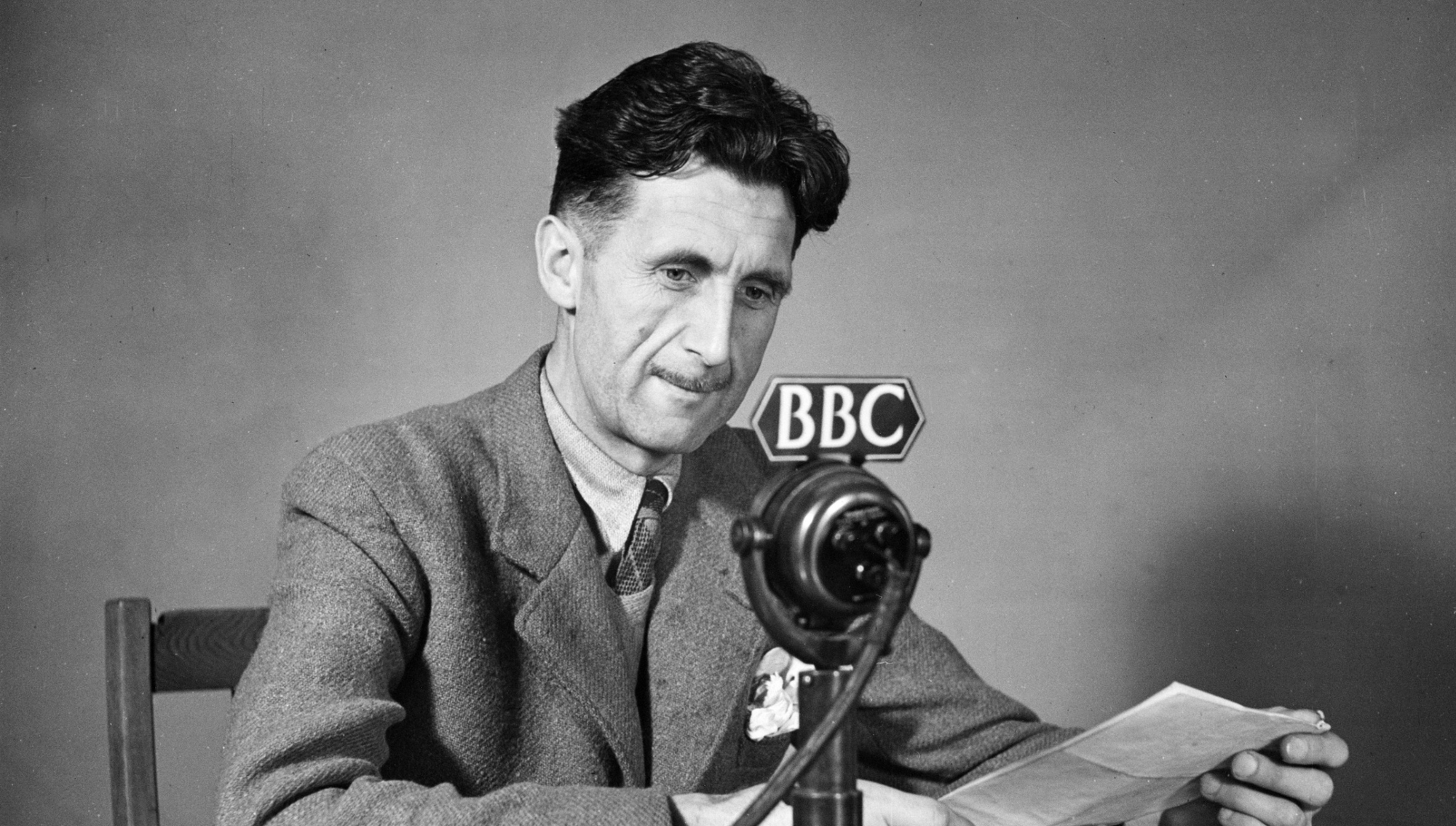Books
The Heretical Impulse: Zamyatin and Orwell
Anglophone readers may be tempted to call Zamyatin a Russian Orwell, but the description works equally well in the reverse.

I
In a 1931 letter to Joseph Stalin, Russian novelist Yevgeny Zamyatin adopted a respectful tone by way of introduction: “My name is probably known to you.” The author of We, the dystopian science fiction novel that influenced Aldous Huxley’s Brave New World and George Orwell’s Nineteen Eighty-Four, had written to Stalin to contest censorship and misrepresentation, and to request permission to migrate—accompanied by his wife—so he could write without the threat of violence or suppression: “To me as a writer, being deprived of the opportunity to write is nothing less than a death sentence.” Zamyatin’s contemporary Rainer Rilke echoed this conviction in his famous Letters to a Young Poet:
Can you avow that you would die if you were forbidden to write? Above all, in the most silent hour of your night, ask yourself for a true answer. And if it should ring its assent, if you can confidently meet this serious question with a simple, “I must,” then build your life upon it.
Zamyatin’s revolt against Stalin occurred in the midst of dekulakization—the mass execution and deportation of millions of “wealthy” peasants—during the first Five Year Plan. As Robert Conquest documented in The Harvest of Sorrow, when Lenin was pressed on defining a kulak, he replied, “You know one when you see one.” Apparently, he saw them all over the place. Stalin ultimately granted Zamyatin’s request for deportation, an uncharacteristic indulgence, perhaps helped by Zamyatin’s stature.
The censorship of Zamyatin occurred when We was denied publication for satirizing Soviet rule. Consequently, the novel first appeared in English in 1924. It wasn’t until several decades later, in 1988, that We was finally issued in its native form. We is written as a notebook kept by Zamyatin’s protagonist, which labels each chapter as a “record,” spanning 40 in total over 200 pages. The reader gets to know the Platonic heaven of One State, which is defended by The Green Wall—a glass shield which blocks the wilderness from the hermetic paradise—before it gets to know the protagonist himself:
As I write this I feel my cheeks burning. Yes: to integrate completely the colossal equation of the universe. Yes: to unbend the wild curve, to straighten it tangentially, asymptotically, to flatten it to an undeviating line. Because the line of One State is a straight line. The great, divine, precise, wise straight line—the wisest of all lines…
Zamyatin forces the reader into the depths of One State—the we—before naming his “I.” Characters don’t have traditional names, they have Numbers. D-503, the protagonist and worker on the space program INTEGRAL, is writing in the year 2500 under the supervision of the Stalin-type figure called the Benefactor.
George Orwell reviewed We in his 1946 Tribune article “Freedom and Happiness,” which was the first time a comparison was made in print between Zamyatin’s novel and Aldous Huxley’s Brave New World. Even though Huxley had been Orwell’s French teacher at Eton College, Orwell proclaimed We the better novel for the way in which it grappled with the irrational tendencies of totalitarian states. We, Orwell argued, was “in effect a study of the Machine, the genie that man has thoughtlessly let out of its bottle and cannot put back again.” Of course, Orwell went on to publish the most famous of the three dystopias with Nineteen Eighty-Four. Given We’s later setting and earlier publication date, the Benefactor is at once both the ancestor and great great grandson of Orwell’s Big Brother. The more apt, slightly more contemporary, comparison is not between Nineteen Eighty-Four and We, but between the Orwell and Zamyatin themselves. Both authors managed to summon the liberal and intellectual spirit while writing in different political climates.
II
“Before anything else, George Orwell was an essayist.” This is the opening line of both of George Packer’s compilations of Orwell’s essays, All Art is Propaganda and Facing Unpleasant Facts. The same might be said about Yevgeny Zamyatin. Orwell’s readers are warmly familiar with “Politics and the English Language,” in which Orwell signals the political and moral dangers of cheapening language, and the manner in which propaganda corrupts thought. Less familiar, but as relevant, is the 1944 entry in Orwell’s “As I Please,” column in which he claims: “Ask a journalist what a jackboot is, and you will find that he does not know. Yet he goes on talking about jackboots.” Writers capable of importing cliches such as “Achilles heel,” “stab in the back,” “blood bath,” have allowed the essay to write itself with readymade phrases. “Clearly,” Orwell wrote, “people capable of using such phrases have ceased to remember that words have meaning.” A few decades earlier, Zamyatin had delivered a series of lectures in the House of the Arts in Petrograd on the same subject:
An experienced writer always knows how to create an artistically synthesized impression of the actual language of the milieu without the crude extremes or distortion—be it the language of the peasant, the intellectual, the Ethiopian, or the horse.
In the same lecture, Zamyatin claimed writers ought to “create an impression of a language” rather than using “banal and hackneyed words which have been used a thousand times.” Both Zamyatin and Orwell shared an aversion to the overused phrase, and were waging the “War Against Cliche” long before Martin Amis gave it a name. Given their shared aversion, Orwell and Zamyatin managed to lock arms stylistically and morally.
The provenance of Animal Farm, Orwell’s first conscious attempt to fuse “political purpose and artistic purpose,” as recorded in his essay “Why I Write,” was noted in the introduction:
On my return from Spain I thought of exposing the Soviet myth in a story that could be easily understood by almost anyone and which could be easily translated into other languages. However, the actual details of the story did not come to me for some time until one day (I was then living in a small village) I saw a little boy, perhaps ten years old, driving a huge cart-horse along a narrow path, whipping it whenever it tried to turn. It struck me that if only such animals became aware of their strength we should have no power over them, and that men exploit animals in much the same way as the rich exploit the proletariat.

Orwell’s natural prose was so accomplished that his friends Malcolm Muggeridge and Sir Herbert Read claimed their children could understand every word of the fairytale without diminishing the prose’s cleverness. The accuracy with which Animal Farm depicted the Soviet perversion of values—labor camps, pogroms, forced famines, secret police, rubber truncheons—reduces the historical complexity of figures like Stalin and Trotsky to a digestible format and makes the novel one of the best accounts of the era. Author and street-leftist Christopher Hitchens once said the best compliment ever paid to Orwell was the Ukrainian and Polish socialists’ disbelief that he was not a Russian.
Zamyatin was paid a similar compliment about his work The Islanders when a Russian reader asked if the English satire “was not a translation from the English.” Zamyatin followed his own advice given in his lecture “On Writing”:
If you are writing about a modern Englishman, you must think in English and write in such a way that what you have written in Russian will read like a good translation from English.
Orwell was an Englishman mistaken for a Russian, and Zamyatin was a Russian mistaken for an Englishman. Before Orwell’s famous remark in “Why I Write,” that good prose is a “window pane,” Zamyatin said that “the author must be invisible.” He did not intend to diminish the prominence of an author’s voice, but rather to push for clearer prose. Prior to Orwell’s famous dictate in “Politics and English Language” that “if thought corrupts language, language can corrupt thought,” Zamyatin wrote: “The writer not only uses language, he also creates it; he creates its rules, its forms, and its vocabulary.” Even their respective comments on Dickens ring a similar tune. Orwell wrote about Dickens’s ability to summon the childhood spirit and mind, as well as his ability to describe something in such a manner that “once heard you never forgot it.” In his lecture “On Language,” Zamyatin claimed that:
On the whole, however, the writer’s range is immediately wider than that of an actor in the theater; the writer’s capacity for reincarnation is far richer. In some writers, it reaches astonishing, incredible proportions: Dickens was such a writer.
How is it possible that two writers, from entirely different countries, could share such similar opinions, advice, topics, and moral conclusions?
III
Zamyatin’s essay “On Literature, Revolution, Entropy, and Other Matters” is to We what Friedrich Nietzsche’s Beyond Good and Evil is to Thus Spoke Zarathustra. That is to say, both authors published explorations of morality the messages of which they later made explicit in works of non-fiction. In “On Literature, Revolution, Entropy, and Other Matters,” Zamyatin tackles a portion of We which Orwell discussed in his review:
“Name for me the final number, the highest, the greatest.”
“But that’s absurd! If the number of numbers is infinite, how can there be a final number?”
“Then how can you speak of a final revolution? There is no final one. Revolutions are infinite.”
Zamyatin continues with an inversion of Voltaire’s observation that if god did not exist, it would be necessary to invent him:
Fangs are sharpened only when there is someone to gnaw on. Domestic hens have wings only for flapping. The same is true for hens and for ideas: ideas nourished on chopped meat cutlets lose their teeth, like civilized, cutlet-eating man. Heretics are necessary to health; if there are no heretics, they should be invented.
Both Orwell and Zamyatin possessed a powerful heretical impulse; the ability to say “No” when the crowd says “Yes,” to acknowledge that reflexive adherence to a narrative is hardly different to its immediate rejection, to recognize the totalitarian instinct is accompanied by the servile one, to know that writing is freedom and freedom is writing.
I know that, while I have been proclaimed a right winger here because of my habit of writing according to my conscience rather than according to command, I shall sooner or later probably be declared a Bolshevik for the same reason abroad.
As it happens, those lines were written by Zamyatin, but they could just as easily have been written by Orwell. When his fellow writers were being persecuted by the All-Russian Writers’ Unions for the crime of writing fiction, Zamyatin resigned in protest. Orwell refused to make alterations to Animal Farm so that the Russian Revolution allegory would remain intact, which prevented its publication for a short time. Anglophone readers may be tempted to call Zamyatin a Russian Orwell, but the description works equally well in the reverse.






